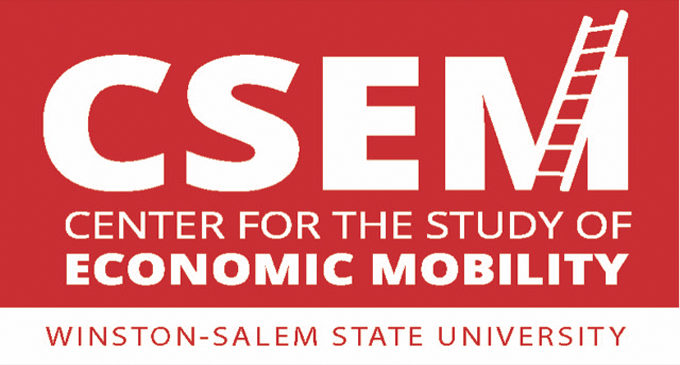Re-entry is bedrock of CSEM work

By John Railey
Fleater “Sunshine” Carpenter isn’t worried about the past. She’s too busy focusing on the future.
In 1986 in Forsyth County, she was convicted of a felony in connection with the theft of jewelry from a local store. She did time in prison. Since her release years ago, she’s been working and helping others, currently as a COVID relief worker affiliated with the Royal Curtain Drama Guild, a nonprofit supported by Winston-Salem State University’s Center for the Study of Economic Mobility, CSEM.
One goal of CSEM is making the invisible visible, encouraging the blossoming of talent in economic development in Winston-Salem. That includes helping released offenders turn their lives around, backed by solid research from CSEM Fellow Douglas Bates, who has surveyed released offenders in the area and found that, of the respondents to his survey, 36.4 % appreciate structure and authority, 77 % said they had anxiety or depression and 31.8% “somewhat agree” that “the powerful dominate the weak.”
He hopes to further develop the survey so that employers can use it to create conducive work environments and relevant support structures for released offenders. Organizers of CSEM-supported programs see the initial survey results in their work. Project M.O.O.R.E., a CSEM supported program, concentrates on re-entry, as well as helping youth before they commit serious crimes. Other programs supported by CSEM, such as Royal Curtain (the RCDG), while not concentrating on re-entry, smoothly weave ex-offenders into their work.
“Everybody needs a second chance,” said Stephanie Hurt, the founding director of the RCDG, which promotes economic development through the plays it puts on and other efforts. “Nobody’s perfect. They’re gifted people and they need opportunities.”
Hurt met Sunshine Carpenter recently through another community improvement effort, The 20. “I love this lady,” Hurt said. She employed Carpenter in one of the RCDG’s sidelines, COVID response. Carpenter works outside vaccination sites, asking patients’ initial questions as she directs them in. (“Be safe and keep your mask on, OK?” she asks them with a smile.)
Hurt plans to put her in a play soon. Carpenter has a beautiful singing voice and a fine sense of comedic timing, Hurt said.
Carpenter said: “Well, you know what? I have the gift of gab and I can sing pretty good, too. I like to make people laugh and can cook my rear off. The two best things in life are a good taste in your mouth and a laugh.”
Carpenter, 65, also has a compelling life story that she subtly tells, especially to at-risk young people. “I say, ‘What you’re doing there, I’ve been there and done that and it didn’t turn out good.’ That kind of grabs their attention. Anybody can get in trouble, and anybody can turn themselves around.”
She grew up in Winston. She waited tables at a local restaurant. She also loved jewelry. She’d go to a local store and admire rings she couldn’t afford. Eventually, she said, the employers would pull out a jewelry tray and walk away. “They trusted me a little much,” Carpenter said.
In 1986, she took jewelry out of the tray, replacing it with costume jewelry she’d purchased elsewhere. The theft wasn’t noticed, she said. But then, she said, after a neighbor forced her into smoking crack cocaine and got her hooked, she pawned some of the stolen jewelry. Soon she said, city police officers came to her home, asking for Fleater Carpenter. “I told them I didn’t know her and she didn’t live here,” Carpenter said.
They returned with her photo, Carpenter said. “I was stuck like chuck right there.”
She was convicted of receiving stolen goods. After her release from prison, she eventually moved back to Winston-Salem, determined to stay straight. She had strong family support, an important factor in released offenders adjusting to the free world. Too many do not have that support. Carpenter is glad she did.
“I did not like being incarcerated,” she said. “I was not about to lose my freedom again. I love being able to move around. I just enjoy the outside. I’m a free spirit. I don’t like to be closed in. I like to eat when I want to eat.”
Many released offenders miss the tight structure of prison, Bates’ research has found, but not Carpenter.
For a while, Carpenter worked for a local nonprofit, selling concessions at events to raise money for it. But for Carpenter, who has blurred vision because of macular degeneration, the heavy work schedule, with many out-of-town events, became too much. She was on the road so much, she joked, that she saw saplings planted in median strips start to grow tall.
Now, she loves her work with the RCDG.
“The past is behind us,” she said. “The future is ours to create.”
John Railey, raileyjb@gmail.com, is the writer-in-residence for CSEM, www.wssu.edu/csem.
















